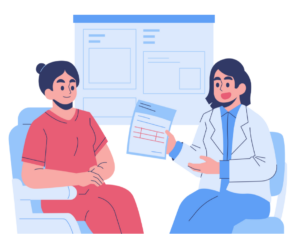
Neuropsychiatric “prodromes” and SLE
 May 21st, 2024
May 21st, 2024 Debbie Kinsey
Debbie Kinsey Latest News
Latest News 0 Comments
0 Comments
The latest research from the INSPIRE project suggests it could be useful for patients and their healthcare team to explore their individual patterns of neuropsychiatric and non-neuropsychiatric symptoms before a flare.
What are “neuropsychiatric” symptoms?
“Neuropsychiatric” (NP) symptoms refers to symptoms that involve the brain, the nervous system, or mental health. That means the term “NP symptoms” covers a wide range, including dizziness, headaches, tremors, anxiety, low mood, hallucinations, and seizures. Fatigue, one of the most commonly reported symptoms of lupus, may also be considered an NP symptom in some cases.
What is a “prodrome”?
A “prodrome” is early signs or symptoms of an illness that happen before the main symptoms start, or before a flare starts. Not all illnesses or conditions have a prodrome, but some that have recognised prodromes include migraines and some neurological conditions such as multiple sclerosis. Not all people who have these conditions experience prodromes but, for those who do, it can help when prodromes of a flare are recognised so that they can have quicker treatment to decrease or stop a flare.
What is the INSPIRE project?
INSPIRE is a project investigating NP symptoms in lupus and similar conditions, comparing the experiences and views of patients and healthcare professionals. There are a series of different studies as part of the INSPIRE project. You can read about INSPIRE’s previous studies here:
• An investigation of how common NP symptoms are in conditions like lupus
• What evidence doctors use to diagnose NP symptoms in lupus
• Examining the evidence for whether an NP symptom is directly caused by lupus
LUPUS UK has contributed funding to the INSPIRE project.
What was this study trying to find out?
As they have discussed in their previous research, it can be difficult to work out if an NP symptom is caused by lupus directly or something else, like medication side effects, the difficulties of living with a chronic illness, or whether you have a separate NP condition that isn’t related to your lupus. This is called the “attribution” of symptoms.
Some medical models use when lupus was diagnosed to help doctors work out if an NP symptom is directly caused by lupus, but this can be inaccurate as many people have symptoms a long time before they get their diagnosis. Some doctors believe that NP symptoms are only directly caused by lupus if they are present when SLE is first diagnosed, but it is not clear if there is good evidence for this.
This study had two main aims:
1. To investigate the timing of when different NP symptoms first appear related to when SLE symptoms first appeared.
2. To explore whether NP symptoms could be a prodrome to autoimmune conditions first starting or as a warning sign of flares.
What did this study do?
The researchers used surveys and interviews with people with SLE, people with other kinds of autoimmune rheumatic diseases, and healthcare professionals involved in their care. They asked about when they first experienced different NP symptoms, when they first experienced other SLE symptoms, and if there was a pattern of symptoms before they had a flare. One doctor on the research team had noticed in their clinic that some SLE patients he saw experienced nightmares before they had a flare, so the team also specifically asked about this to see if there was any evidence to support it.
What did they find out?
 There were four main findings in their results:
There were four main findings in their results:
1. They found some NP symptoms did not first appear at the same time as SLE symptoms started. It was not possible for them to be sure whether the NP symptoms were caused by SLE or not, but it may suggest that NP symptoms that start later could still be caused by SLE. There were differences in opinion between different types of healthcare professional and different patients about whether they attributed NP symptoms directly to SLE.
2. Some patients were able to describe a pattern and progression of symptoms before they had a flare, like a prodrome. The specific symptom pattern was usually different for different patients, but could be similar between flares for the same patient. Most healthcare professionals said it was difficult in short appointments to discuss and work out with patients if they had a symptom pattern before a flare. Some patients described NP symptoms as being part of their prodrome, but that the symptoms were often not discussed with their doctors.
3. If a patient experienced hallucinations before a flare, they often reported having disrupted sleep and nightmares before their hallucinations started. Patients in the study found it easier to talk about hallucinations when they were called ‘day-mares’. Some patients said they had increasing nightmares and hallucinations before a flare of their lupus.
4. Lots of the patients talked about having been misdiagnosed with mental health conditions before they had a diagnosis of SLE.
What were the conclusions?
Because patterns of symptoms were usually different between different people, the researchers couldn’t describe a prodrome for an SLE flare that would apply to all patients. However, as lots of patients in the study experienced their own patterns of NP and non-NP symptoms before a flare, the researchers suggested it could be useful for doctors and nurses to explore this with patients in their appointments. If a patient knows what their own prodrome predicting a flare may be, they may be able to get treatment and support before it progresses. The researchers highlighted it was important to ask patients about NP symptoms when discussing possible prodromes, as these were included in what patients in the study described in their patterns even though they are not usually symptoms included in diagnosing lupus.
The researchers suggested doctors use the term “daymare”, instead of “hallucination”, to help patients feel more comfortable talking about this symptom. They also suggested doctors should ask about disrupted sleep and nightmares as a possible prodrome for patients who experience hallucinations.
This study did not include some things that can make the attribution of NP symptoms more complicated, such as medication side effects, other life stresses, or having other mental illnesses. This means it’s hard to say for sure whether the NP symptoms the patients described were caused directly by their lupus or by something else. They suggested more research needs to be done to investigate NP symptoms and prodromes, to help investigate possible prodromes which could allow people to be treated more quickly when they are about to have a flare.
What happens next?
The INSPIRE team is continuing to study NP symptoms in lupus and other systemic autoimmune rheumatic diseases.
You can read the full scientific paper of this study on the journal’s website here.
It is very common to experience NP symptoms – you are not alone. There are a number of places you can find support.
o Talk to your rheumatologist:
If you are experiencing neuropsychiatric symptoms, talk to your rheumatologist about them. They can assess what the causes may be and refer you for support or treatment if needed. You may find our blog article on getting the most out of your medical appointments helpful in planning what you would like to say and how. If your doctor is not listening to you or believes these symptoms are not common, you can take in a copy of this article or the research paper to show them.
o Get mental health support:
The NHS offers different mental health services, such as counselling and helplines. Sometimes you have to be referred by a GP, and sometimes you can refer yourself. You can find what services are available in your local area and how to access them on this page here. You can also self-refer to the Wren Project, which is an emotional support service for people with autoimmune conditions, without going to your GP. You can find more information about them here.
o You need urgent support and need to talk to someone immediately:
If it is an emergency or you are in immediate danger, call 999 or go to A&E. Your mental health is just as important as your physical health and you are not wasting anyone’s time.
If it’s urgent but not an emergency, there are some NHS and charity services you can call:
o Call 111 or go to 111 online
o Find your local NHS England urgent mental health helpline here
o Find your local mental health charity helpline here
o Call a charity mental health helpline. You can find a list on the Mind website here. If you need to talk right now, these helplines are free and open at all times:
a. Samaritans – 116 123 (UK-wide)
b. A.L.L. – 0800 132 737 (Wales only)
c. If you would prefer to text rather than talk, you can text SHOUT – 85258 (UK-wide)




 ©2024 LUPUS UK (Registered charity no. 1200671)
©2024 LUPUS UK (Registered charity no. 1200671)